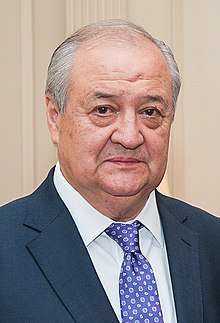Abdulaziz Kamilov
Abdulaziz Khafizovich Kamilov[3] (Uzbek: Abdulaziz Xafizovich Kamilov;[4] Russian: Абдулазиз Хафизович Камилов, Abdulaziz Chafizovič Kamilov; born November 16, 1947) is an Uzbek politician who has been Uzbekistan's Minister of Foreign Affairs since 2012. Previously he served in the same post from 1994 to 2003.[5]
Abdulaziz Kamilov | |
|---|---|
 | |
| Minister of Foreign Affairs of Uzbekistan | |
| Assumed office 11 February 2012 | |
| President | Islam Karimov Shavkat Mirziyoyev (acting) |
| Preceded by | Elyor Ganiyev |
| In office 25 February 1994 – 14 March 2003[1] | |
| President | Islam Karimov |
| Preceded by | office established[2] |
| Succeeded by | Sodiq Safoyev |
| Deputy Minister of Foreign Affairs of Uzbekistan | |
| In office 11 February 2008 – 11 February 2012 | |
| President | Islam Karimov |
| Preceded by | Elyor Ganiyev |
| Succeeded by | Elyor Ganiyev |
| Personal details | |
| Born | November 6, 1947 Yangiyo'l, Uzbek SSR, USSR |
Early life and education
Kamilov was born on November 16, 1947, in Yangiyo'l, Uzbekistan. He graduated from the Diplomatic Academy of the Ministry of Foreign Affairs of the Soviet Union. From 1978 through 1980, he was a post-graduate student at the Eastern Studies department of the Academy of Sciences of the USSR. He has a PhD in History.[5]
Political career
Kamilov worked as an attaché of the Soviet Embassy in Lebanon from 1973 until 1976. In 1980–1984, he worked as the second secretary of the Soviet Embassy in Syria and in 1984–1988 in the Department of Middle Eastern Affairs of the Ministry of Foreign Affairs of the Uzbek SSR. In 1988–1991, he worked at the Department of World Economy and Foreign Affairs of the Academy of Science of the USSR. In 1991–1992, he was advisor to the Embassy of Uzbekistan in Russia. From 1992 until 1994, Kamilov served as the Deputy Minister of National Security, and in 1994, he was appointed as Minister of Foreign Affairs of Uzbekistan.[5] At the same time, from 1998 until 2003, he was the rector of University of World Economy and Diplomacy. He remained in the post of Foreign Minister until March 14, 2003, when he was replaced by Sodiq Safoyev,[1] a few months before the government of Prime Minister O'tkir Sultonov resigned. He was then appointed as National Foreign Affairs Advisor to the President of Uzbekistan.
He was subsequently appointed as the Ambassador of Uzbekistan to the United States and Canada with residence in Washington, D.C. on December 4, 2003[6] In 2008, while in Washington, he also assumed the duties of ambassador to Brazil.[5] In 2010, Kamilov was appointed as First Deputy Minister of Foreign Affairs,[7] and he returned to the post of Minister of Foreign Affairs in 2012.
Awards
Kamilov has the rank of Ambassador Extraordinary and Plenipotentiary. He was awarded Uzbek national awards of Mekhnat Shukhrati and Uzbekiston belgisi.
Personal life
Komilov is fluent in Arabic, English and Russian. He is married and has a son.[5]
References
- "В Узбекистане – новый министр иностранных дел" [Uzbekistan gets a new Minister of Foreign Affairs]. Archived from the original on 2008-09-04. Retrieved 2010-10-01.
- "The governmental portal of the Republic of Uzbekistan. Ministry of Foreign Affairs of the Republic of Uzbekistan". Archived from the original on 15 October 2010. Retrieved 2010-10-01.
- http://www.mfa.uz/en/about/stucture/
- http://www.mfa.uz/uz/about/structure/
- "Руководящий состав" [Administration]. Archived from the original on 6 October 2010. Retrieved 2010-10-01.
- The Washington Diplomat Newspaper – Ambassador Profile Archived 2006-11-28 at the Wayback Machine.
- "Ministry of Foreign Affairs of Republic of Uzbekistan: Structure of the MFA". Archived from the original on 24 September 2010. Retrieved 2010-10-01.
External links
| Wikimedia Commons has media related to Abdulaziz Komilov. |